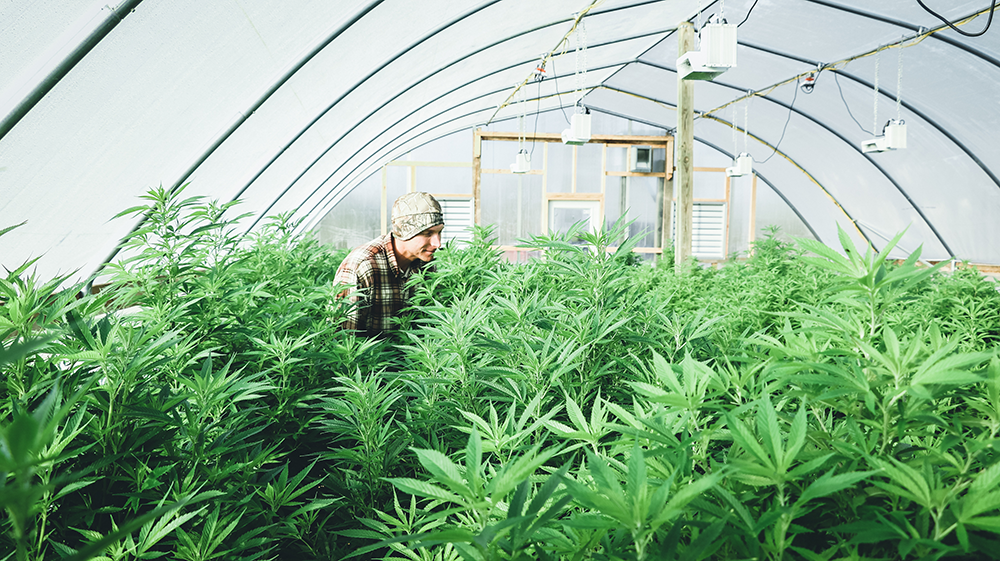Choose a different country or region to see the content specific to your location
Select Your Country/Region
Current Region:
 USA (EN)
USA (EN)
Starting a hemp farm is an exciting journey that combines agriculture, sustainability, and the growing demand for hemp-based products.
Here’s a step-by-step guide to get started - and a way to make your venture even more efficient with the Dosatron Hobby Cultivator.
Hemp farming is heavily regulated. Research and obtain the necessary permits and licenses in your region. This ensures compliance with THC content limits and other legal requirements. Learn more about hemp rules & regulations (department of agriculture).
Selecting the right hemp variety is crucial for the success of your farm. Each variety has unique characteristics suited for specific uses - whether you’re targeting fiber, seeds, or CBD production.
Here’s a breakdown of the main types of hemp:
Produce textiles, paper or bioplastics, fibre hemp varieties are the way to go.These plants grow tall and have strong stalks. Popular varieties include Kompolti and Futura 75, known for their high fiber yield.
Seed hemp varieties are cultivated for their nutritious seeds, which are rich in omega-3 and omega-6 fatty acids. These seeds are usefull in foods, oils and cosmetics production. Varieties like Finola and X-59 are well-known for seed production.
For CBD extraction, choose varieties bred for their high cannabinoid content and low THC levels (below 0.3%). Strains like Charlotte’s Web and Cherry Blossom are popular for producing high-quality CBD.
Some varieties are versatile and can be used for both fiber and seed production. These are great for farmers exploring multiple markets like Fedora 17.

Hemp is a resilient crop, but its success depends greatly on soil quality and proper site selection.
Begin by choosing a location with well-drained soil and abundant sunlight, as hemp thrives in full sun for at least 6–8 hours a day.
Avoid areas prone to waterlogging or extreme shade, as these can stunt growth and reduce yields.
A comprehensive soil test is a critical first step.
Hemp grows best in soil with a pH between 6.0 and 7.5, rich in organic matter, and with good aeration.
Testing helps determine the levels of essential nutrients such as nitrogen (N), phosphorus (P), and potassium (K), along with micronutrients like calcium and magnesium. Based on the results, you can amend the soil with compost, lime, or other fertilizers to balance its nutrient profile.
Plow or till the soil to remove weeds, aerate it, and create a fine seedbed. Hemp roots grow deep, so ensure the soil is loose to encourage root penetration and better nutrient absorption. Adding organic matter like compost or well-rotted manure improves soil structure and fertility.
Certain hemp varieties may prefer slightly different soil conditions, depending on whether they’re grown for fiber, seeds, or CBD. Plan your amendments accordingly to meet the needs of your chosen variety.
Plan Your Fertigation Strategy Hemp requires precise nutrient delivery for optimal growth. This is where the Dosatron Hobby Cultivator shines. Perfect for small-scale farmers and hobbyists, this system ensures consistent and accurate mixing of nutrients, taking the guesswork out of fertigation.
Plant your hemp seeds or clones during the optimal growing season. Use tools like the Dosatron Hobby Cultivator to save time and ensure efficient nutrient delivery.
Once your plants mature, carefully harvest and process them for their intended use. With the right hemp variety and tools like the Dosatron Hobby Cultivator, you’ll have a strong foundation for success. Visit Dilution Solutions to explore the pricing and features of the Dosatron Hobby Cultivator.